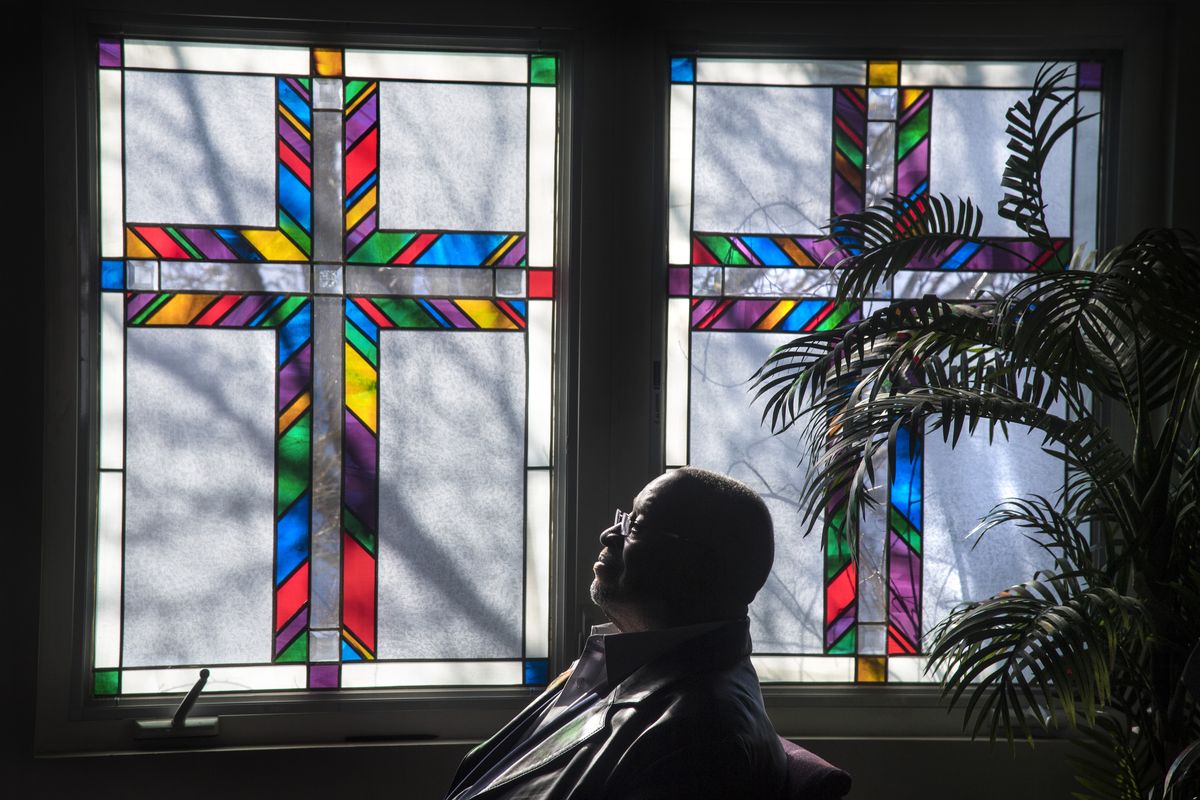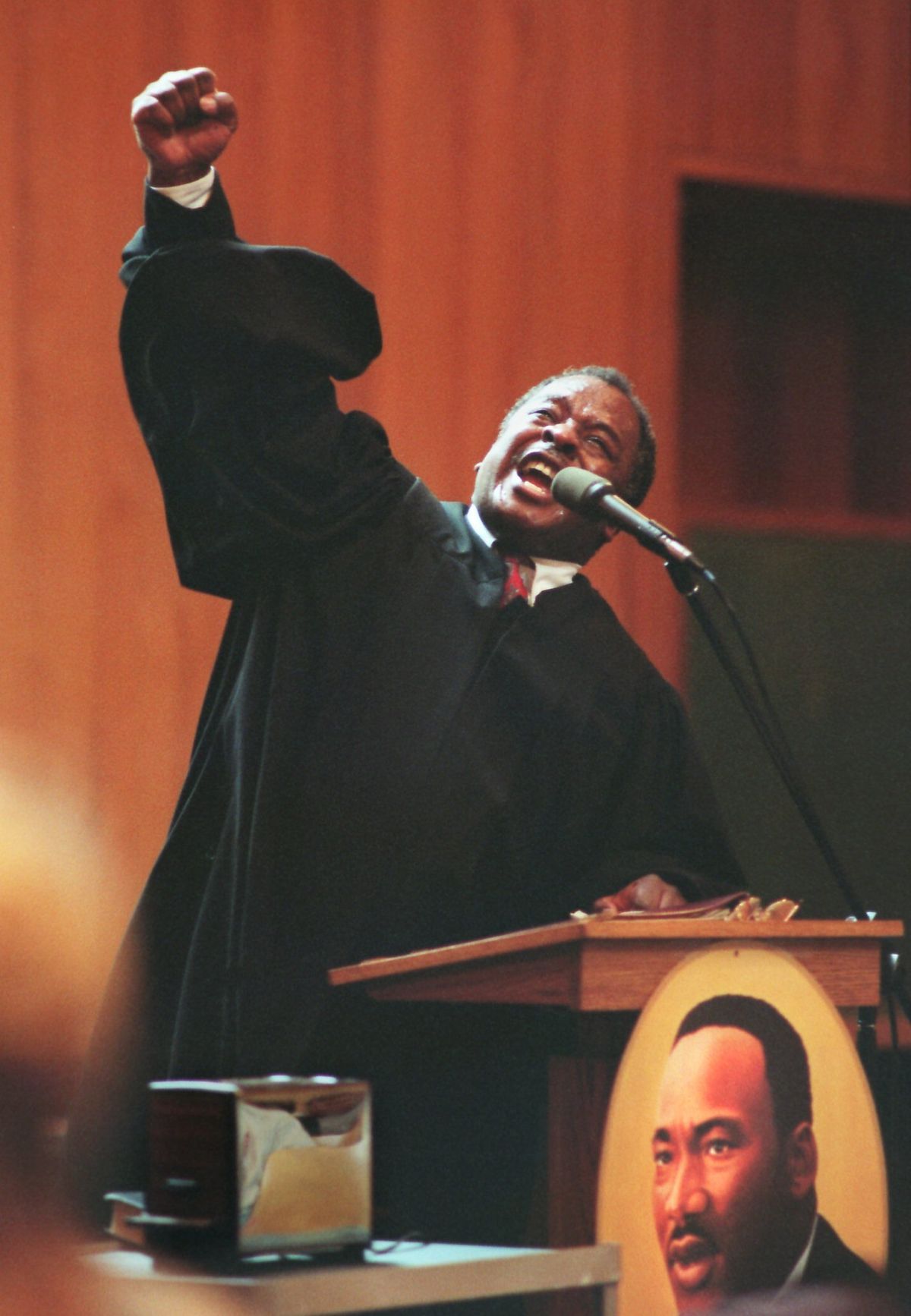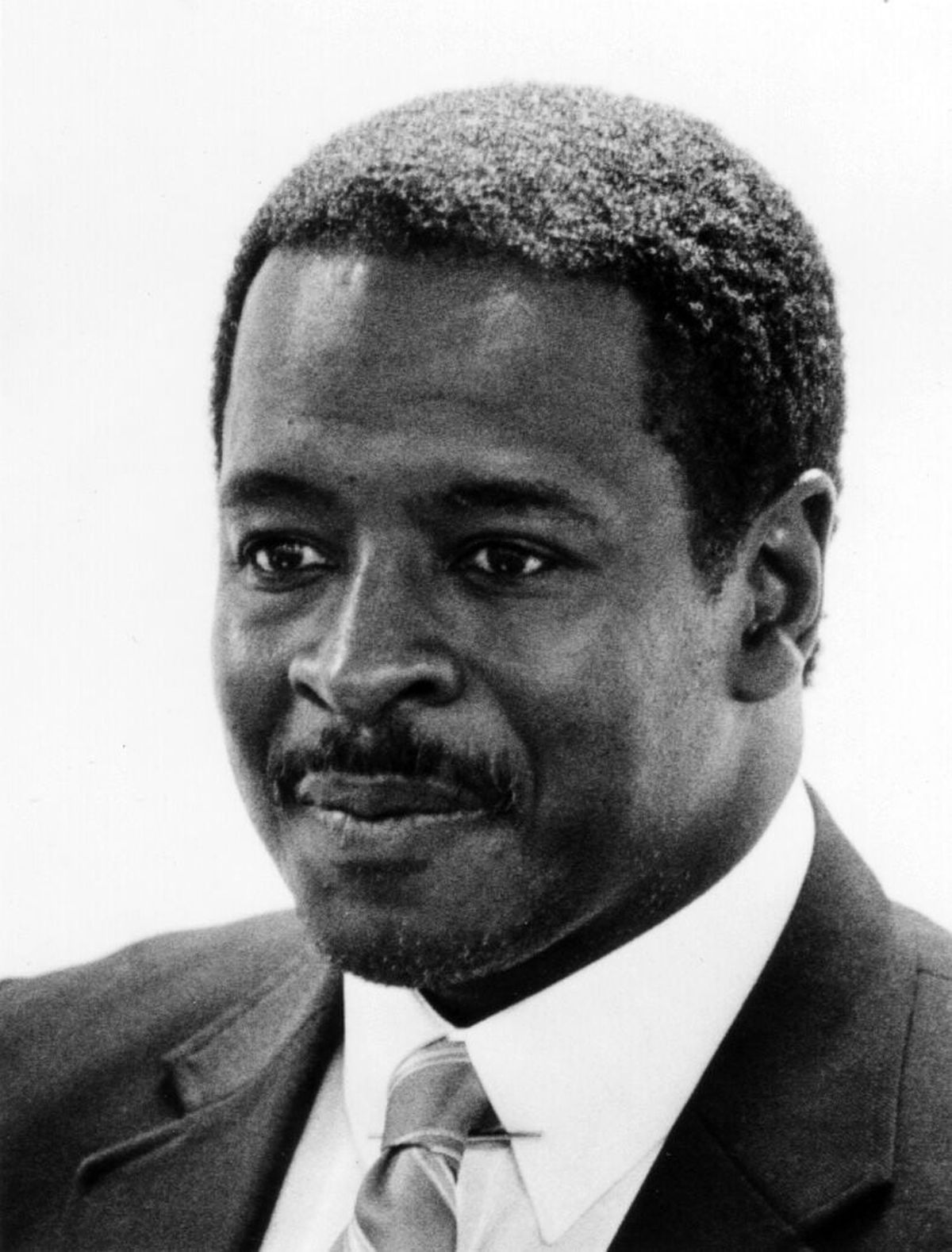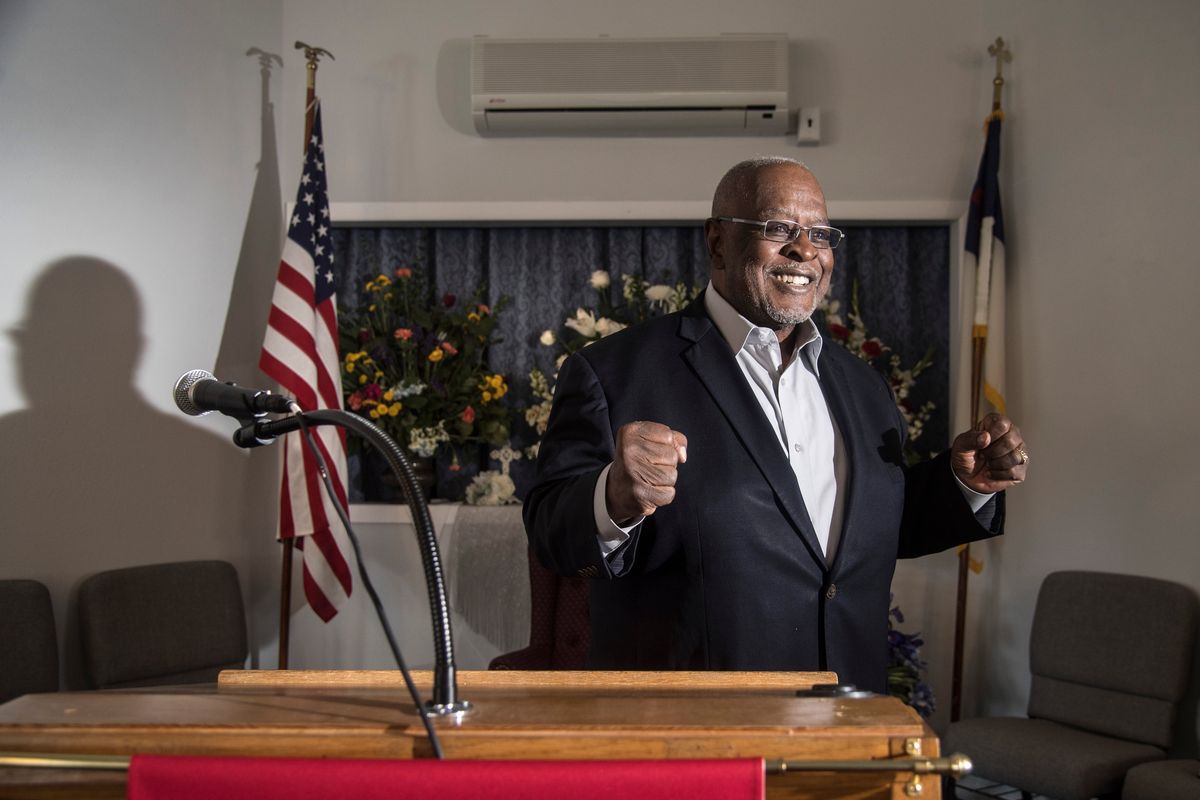‘The symbol of belonging in Spokane County’: Local civil rights leader and pastor Happy Watkins dies at 82
Rev. Happy Watkins speaks to a crowd gathered for a NAACP rally, March 6, 2015, in downtown Spokane, Wash. Watkins died Friday, October 25, 2024, at the age of 82. (Dan Pelle/The Spokesman-Review)
Percy “Happy” Watkins, who co-founded Spokane’s annual march commemorating the Rev. Martin Luther King Jr. and worked to boost diversity in Spokane’s police force and fairness in the public schools, died Friday. He was 82.
For decades he was known for giving voice to King as he recited the “I Have a Dream” speech every year at Spokane’s annual Martin Luther King Jr. Day march.
“I’ve never heard or seen someone do this as well as Happy Watkins,” said Kiantha Duncan, former NAACP Spokane president, of Watkins’ “I Have a Dream” speech.
The tradition of his annual recitation started as early as 1971 – only three years after King was assassinated.
“It is with a heavy heart that we learn about the passing of Reverend Happy Watkins. Born in the Bronx, but a Spokanite in heart and soul since 1961, he has served our community with a heart of gold and helped us remember the words of Dr. King, as he recited the ‘I Have a Dream‘ speech every year like clockwork and at events throughout the year,” Spokane City Council President Betsy Wilkerson wrote on Facebook.
Watkins was pastor of New Hope Baptist Church – leading the church since 1990 until his retirement in 2018.
Roberta Greene, who served on the Spokane City Council from 1996 to 2004, said Watkins was instrumental in keeping his church alive and always focused on the Lord.
“His eyes were always there,” she said.
Greene said Watkins was a role model for minority children.
“This community has lost a strong advocate for strength in diversity,” Greene said.
Watkins and his close friend Ivan Bush, another prominent civil rights leader in Spokane, organized the annual King march in Spokane for decades.
Born in the Bronx, Watkins came to Spokane in 1961 as an airman stationed at Fairchild Air Force Base. In a 2018 profile, Watkins expressed his bewilderment at the comparatively rural and white Spokane.
“I was 19 and half years old and I started crying … (I was told) about bears, severe winters. I was destroyed,” he recalled.
Still, Watkins found community in the church and soon called Spokane home.
Over the course of more than 60 years in the city, Watkins worked as an insurance salesman, opened a barbecue restaurant, ran for city council, led the local NAACP, married his wife Etta and raised four sons.
Curtis Hampton, a racial equity activist and one of the original members of Spokane Community Against Racism, used words like “special,” “hero” and “icon” to describe Watkins.
He said “Happy” was an appropriate name because Watkins always had a smile on his face.
Hampton said he used to take his family to listen to Watkins speak on Martin Luther King Jr. Day. He said he first met Watkins when he recited the “I Have a Dream” speech at Whitworth University.
“ ‘I Have a Dream’ ” for me has become Happy’s ‘I Have a Dream,’ ” Hampton said.
From then, he said he followed Watkins everywhere to hear him speak. They became great friends and he respected Watkins deeply.
Hampton said Watkins was always on the forefront of social justice. He said he helped recruit Black officers to the Spokane Police Department.
In 1987, Mayor Vicki McNeill presented outstanding citizen awards to three Black ministers, including Watkins, who were instrumental in recruiting minority police applicants, according to a Spokesman-Review story at the time.
The City Council approved a program that year to bring more Blacks and other minorities to the police force, which at the time had no Black officers and only five minority officers among the 225 commissioned officers on the force, the newspaper reported.
Watkins also advocated for more women and minorities on the city payroll.
“We’re not asking for someone to give us anything,” Watkins said in a 1986 Spokesman-Review story about urging the city to change hiring rules to put more women and minorities in the city workforce. “We’re just asking for a chance.”
Hampton said Watkins is a great loss to Spokane, and hopes the city can recognize him with a monument or something permanent so future generations understand his impact.
“I know Spokane’s going to miss him,” he said.
Spokane Superior Court Judge Breean Beggs said Watkins always had an encouraging word for him. Beggs is the former director of the Spokane Center for Justice, which focused on civil rights issues.
“To me, Happy was the symbol of belonging in Spokane County. More than anyone I know, he exemplified that,” said Beggs, a former Spokane City Council president. “He made Spokane a better place.”
Steve Corker, who served eight years on the Spokane City Council, said Watkins was a like a “surrogate father” to him.
“I’m going to miss him,” Corker said. “He was a kind, good human being and we need more of them. He was willing to talk and willing to bring people together, and we need more of that, too.”
Corker and Watkins were active in Democratic politics in the 1970s, Corker said.
He said Watkins mentored him during that time when Corker was in his 30s and relatively new to Spokane and politics.
“He was one of the kindest individuals I ever met in the city of Spokane,” Corker said.
Watkins helped him understand minority issues during his early political career and both were involved in the campaign of James Chase, who was elected in 1981 as Spokane’s first Black mayor.
Former Spokane Mayor David Condon, who served two terms in the 2010s, said Watkins came into his office numerous times to discuss issues focused on police and community relations, community centers and the Black community.
Condon believed the first time he met Watkins was at the opening of Martin Luther King Jr. Way, which glides by the University District.
“He’s a titan in our community whose legacy will live on for generations to come,” Condon said.
Spokane Mayor Lisa Brown met with Watkins during her time as a state lawmaker. Brown said he was a leader for education, civil rights and community development.
She said the incivility seen nowadays would be impossible with him in the room because of his spirit and the way he carried himself.
Brown said she’s saddened by his loss, but he left feelings of peace, hope and inspiration.
“Don’t be satisfied with injustice, but also don’t despair,” she said. “Both of those messages is always what he put forward.”
Watkins was a longtime leader of Spokane’s NAACP. Former chapter president Kurtis Robinson said Watkins kept the organization together as president when membership dwindled.
“He was there to keep the NAACP alive. And we need to do the same. His call for us is to pick up the baton. His legacy is for us to take it further,” he said.
Robinson said Watkins was still the man who could stir a crowd to tears with the words of MLK Jr.
“I know Happy had a dream for us, too,” he said.
Michael Brown, owner of Fresh Soul restaurant in East Central Spokane and executive director of Spokane Eastside Reunion Association, said Watkins came into his restaurant at least once a week and ordered catfish, red beans and rice, cornbread and lemonade.
Brown, who knew Watkins for about 50 years, said the two would chat, at times, for hours. He said Watkins always fought for equality and what was right.
“He would always defend the underdog,” Brown said.
Fred Schrumpf, former principal of Havermale High School and former district coordinator for community partnerships and restorative practices for Spokane Public Schools, said he remembered Watkins for his “I Have a Dream” speeches and for starting and enhancing the Martin Luther King Jr. Day march with Bush.
Watkins delivered several speeches at K-12 schools in the week leading up to the holiday, Schrumpf said.
“That speech came alive and he had every student totally engaged,” Schrumpf said.
He said Watkins also advocated for Black youth by facilitating meetings among Black ministers and pastors, including himself, and school administrators at Spokane high schools and middle schools.
Schrumpf said the meetings built relationships and trust between the two groups, and therefore, were instrumental in improving minority high school graduation rates and essentially eliminating discipline disproportionality for minority students.
“I just thought what a wonderful opportunity for people to get together in a safe, trusting, relationship-building environment,” Schrumpf said of the meetings.
James Murphy, who served 28 years as a judge in Spokane County Superior and District courts before retiring in 2003, also recalled Watkins as a civil rights leader in Spokane and an articulate speaker of Martin Luther King Jr. speeches.
“I think Happy Watkins did an excellent job engendering the sort of spirit Dr. King engendered,” Murphy said.
Murphy said Watkins was a great role model for the Black and white community and attracted a huge following of people who loved to listen to him speak, in turn establishing great credibility in the quest for equality, Murphy said.
“The (Martin Luther King Jr.) parade that Happy and Ivan Bush started has grown into something that embodies a spirit of commitment to civil rights in this community,” Murphy said.
He said Watkins played a large role in the Dr. Martin Luther King Jr. Community Center, which became a place for the Black community to gather and establish programs they could engage, Murphy said.
Spokane Unitarian pastor and friend of Watkins, Todd Eklof, said Watkins was an icon who “acted as a role model for everyone who knew him.” Before a referendum on marriage equality in 2012, Watkins spoke publicly for his support of gay marriage. The move surprised some, but it was just one example of his courage, Eklof said.
“Happy expressed his traditional faith in a nontraditional way,” he said of the Baptist preacher. “He was happy. And he made everyone else happy, too.”
Jonathan Brunt contributed to this report.
The Rev. Percy “Happy” Watkins visits the Veradale United Church of Christ for a gathering of Faith Leaders & Leaders of Conscience on Feb. 21, 2018, in Spokane Valley just before his retirement from the New Hope Baptist Church. Watkins died Friday at age 82. (Dan Pelle/The Spokesman-Review)


















